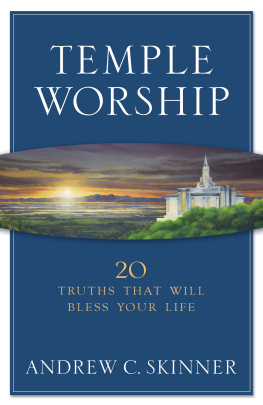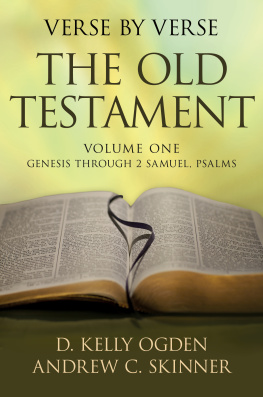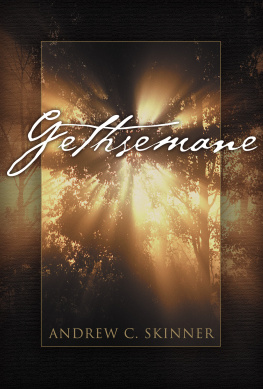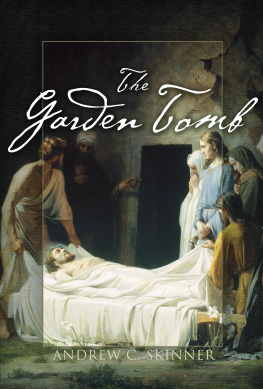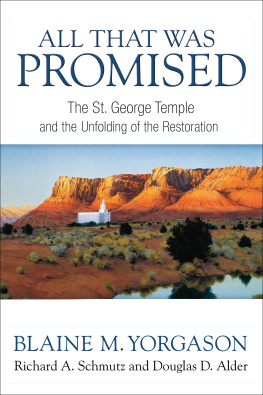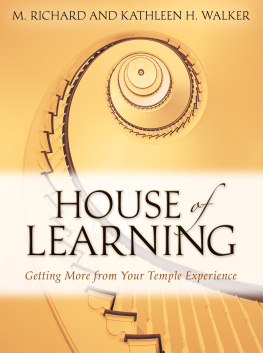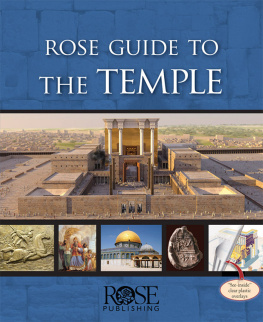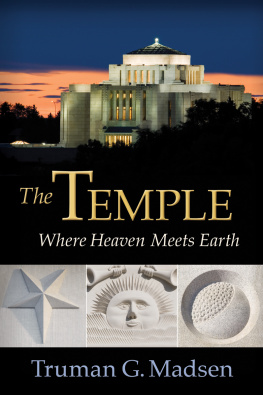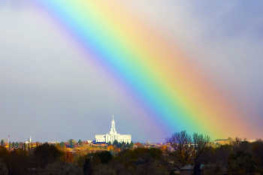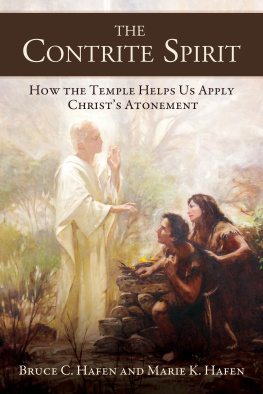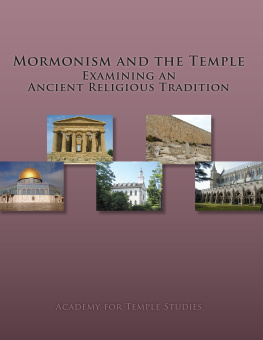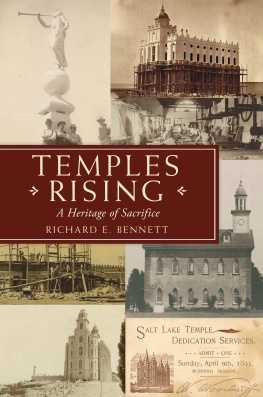Temple Worship
20 Truths That Will Bless Your Life
Andrew C. Skinner
2007 Andrew C. Skinner.
All rights reserved. No part of this book may be reproduced in any form or by any means without permission in writing from the publisher, Deseret Book Company, P.O. Box 30178, Salt Lake City Utah 30178. This work is not an official publication of The Church of Jesus Christ of Latter-day Saints. The views expressed herein are the responsibility of the author and do not necessarily represent the position of the Church or of Deseret Book. Deseret Book is a registered trademark of Deseret Book Company.
Acknowledgments
Nothing of worth in my life has ever happened without the help of heaven, loved ones, friends, and scholars. Nothing I have ever written has found its way into print without the assistance of many individuals. In the writing of this volume on the blessings and doctrinal truths of our temple worship, I have had superior help.
To my wife, Janet, goes my everlasting appreciation for her insights, her patience as I wrote, and her example. She shows our family what it means to put the lessons learned from her temple worship into practice. She is my confidante and companion in every way. I thank my children, especially Cheryl, Mark, and Suzie, for asking questions about the temple that helped clarify my thinking.
I thank my professional assistant at the Neal A. Maxwell Institute for Religious Scholarship at Brigham Young University, Alison Coutts, for her help in the creation of the manuscript. I have prevailed on her good graces too often, and yet she has remained cheerful without fail. Her gospel scholarship, editorial expertise, and efficiency have been a blessing. As usual, thanks likewise go to Connie Lankford Brace, my secretary for many years at BYU, for her watchful eye, which has also helped to guide this project to completion. She and her husband are dear friends. I also thank our student secretary at the Neal A. Maxwell Institute, Elin Jenson, for reading the manuscript and offering suggestions as well as encouraging words.
Last but not least, I thank my friends at Deseret Book Company for their help and encouragement. Cory Maxwell is a gentleman and a scholar. He is perhaps the most patient and positive professional in the publishing industry. Suzanne Brady has been my editor and my good friend for more years than either one of us will admit to outsiders. She is everything an author needs in an editor.
Introduction: Reflections on the temple
This volume touches on truths that we may glean from our experiences in the house of the Lord and which can bless our lives and strengthen our testimonies. Obviously it is not comprehensive. It does not teach in detail about what happens in the temples of the Lord but, rather, discusses the doctrines and principles on which temple worship is founded and the blessings that flow from temple worship. It came about as the culmination and convergence of several developments.
More than a decade ago, I began thinking intensely about statements made by Hugh Nibley regarding the temple. He had said profound things, truths that have become a part of me, my own thoughts and my own words, though their exact expressions are original with him.
In fact, our English word temple comes from the Latin templum and means "a sacred space," marked out for the observation of the heavens. In the ancient Roman worldview, the heavens were the place where signs and portents originated and from where the gods answered humans. A temple was a place where sacred things took place involving gods and mortals.
Professor Nibley's insights became all the more profound to me while I was researching and writing about the Dead Sea Scrolls. In particular, I reflected seriously on the beliefs and practices of the Essenes, who were likely the covenanters living in the Dead Sea Scrolls community of Qumran. The texts and practices that riveted my attention, and continue to do so, are those that touch on the temple.
The scrolls indicate that the members of the Qumran community regarded themselves as true Israel surrounded by spiritual traitors and false brethren in a corrupt world. A principal theme of the Dead Sea Scrolls concerns the community awaiting the advent of certain messiahs from their wilderness habitation, where apostasy and persecution had driven them. They believed the Jerusalem temple had become defiled by the corrupt priesthood serving there. The basic ideal for the covenant makers at Qumran was to live as though they were in the midst of the temple itself, every minute of every day. They sought to make their isolated community an open-air temple, and they wore white linen robes to symbolize the level of temple-like purity they sought to attain.
Of special interest among the Dead Sea Scrolls is the Temple Scroll found in Cave 11 at Qumran. It is the longest of the scrollstwenty-seven feet of parchment (leather) sheets stitched togetherand purports to record the words of God to Moses. The text describes an ideal temple to be established by God himself at the end of days (last days) and that temple's connection with the covenant God made with Jacob at Bethel. Says God: "And I will consecrate my Temple by my glory, [the Temple] on which I will settle my glory, until the day of the blessing [or, the day of creation] on which I will create my Temple and establish it for myself at all times, according to the covenant which I have made with Jacob at Bethel."
This passage caught my attention when I first read it because of Latter-day Saint prophetic commentary on Jacob's covenant at Bethel. In a powerful discussion entitled "TemplesThe Gates to Heaven," President Marion G. Romney seems to have implied that the events at Bethel recorded in Genesis 28 constituted Jacob's endowment:
Pondering upon the subject of temples and the means therein provided to enable us to ascend into heaven brings to mind the lesson of Jacob's dream. You will recall that in the twenty-eighth chapter of Genesis there is an account of his return to the land of his father to seek a wife from among his own people. When Jacob traveled from Beersheba toward Haran, he had a dream in which he saw himself on the earth at the foot of a ladder that reached to heaven where the Lord stood above it. He beheld angels ascending and descending thereon, and Jacob realized that the covenants he made with the Lord there were the rungs on the ladder that he himself would have to climb in order to obtain the promised blessingsblessings that would entitle him to enter heaven and associate with the Lord.
Because he had met the Lord and entered into covenants with him there, Jacob considered the site so sacred that he named the place Bethel, a contraction of Beth-Elohim, which means literally "the House of the Lord." He said of it: "... this is none other but the house of God, and this is the gate of heaven." (Gen. 28:17.)
Jacob not only passed through the gate of heaven, but by living up to every covenant he also went all the way in. Of him and his forebears Abraham and Isaac, the Lord has said: "... because they did none other things than that which they were commanded, they have entered into their exaltation, according to the promises, and sit upon thrones, and are not angels but are gods." (D&C 132:37.)
Temples are to us all what Bethel was to Jacob.
This stunning statement makes the Old Testament come alive to Latter-day Saints and causes us to be impressed with the importance placed on the temple by the covenant makers at Qumran. Though we have no indication that the Qumran community regarded their ideal future temple described in the Temple Scroll as anything more than an Aaronic priestly edifice, albeit in a pure and uncorrupted form, they understood the significant connection between covenants, Israel, and the temple. And their belief system bears witness to the truth that the temple was the center of their community.

